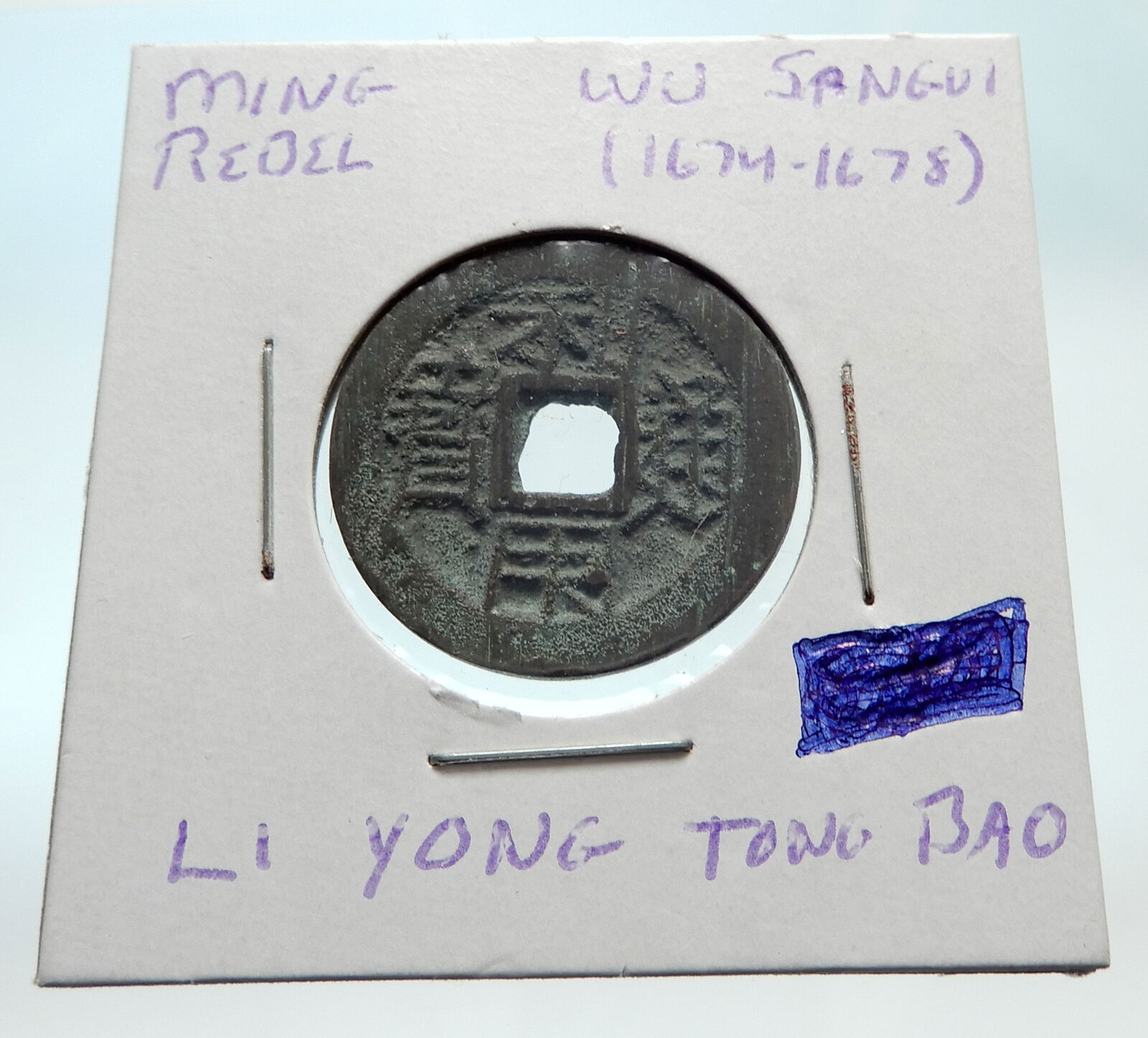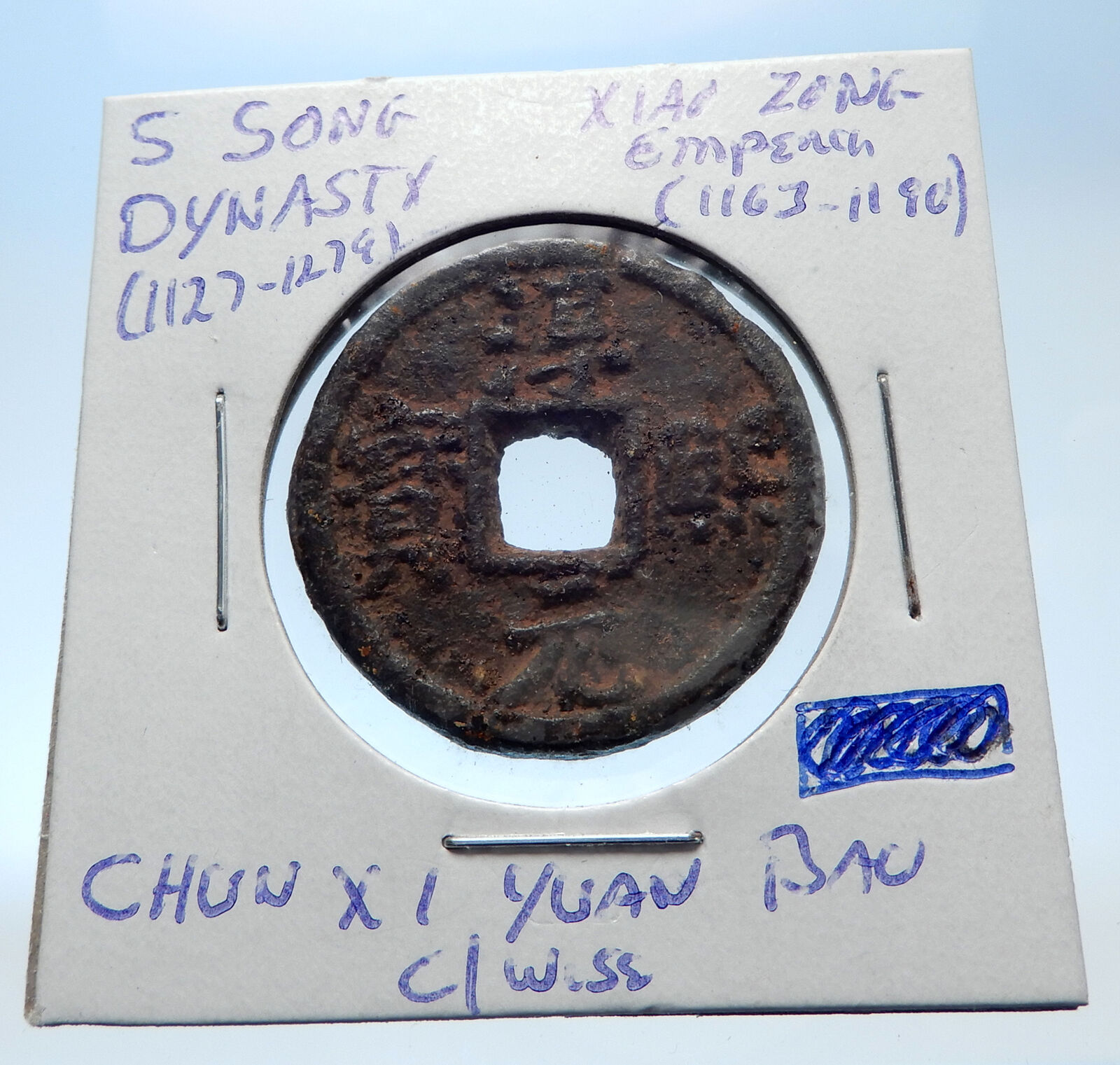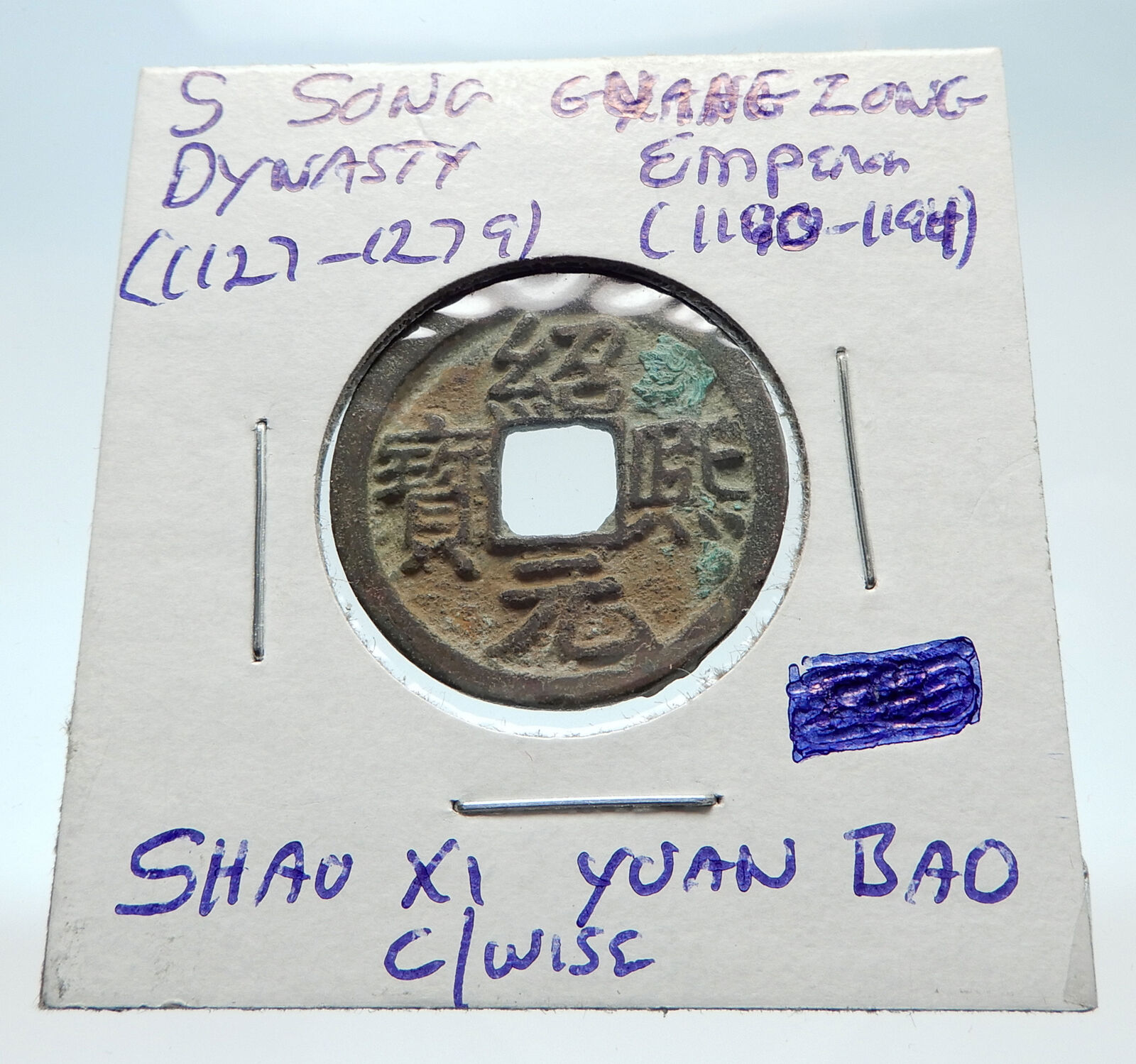|
China – Northern Song Dynasty (960-1127 A.D.)
Ying Zong – Emperor: 1064-1067 A.D.
Zhi Ping Yuan Bao
Bronze Cash 26mm (4.09 grams)
Reference: Hartill 16.156
You are bidding on the exact item pictured, provided with a Certificate of Authenticity and Lifetime Guarantee of Authenticity.
 Emperor Yingzong of Song (16 February 1032 – 25 January 1067), personal name Zhao Shu, was the fifth emperor of the Song dynasty in China. His original personal name was Zhao Zongshi but it was changed to “Zhao Shu” in 1062 by imperial decree. He reigned from 1063 to his death in 1067. He was succeeded by his eldest son, Emperor Shenzong. Emperor Yingzong of Song (16 February 1032 – 25 January 1067), personal name Zhao Shu, was the fifth emperor of the Song dynasty in China. His original personal name was Zhao Zongshi but it was changed to “Zhao Shu” in 1062 by imperial decree. He reigned from 1063 to his death in 1067. He was succeeded by his eldest son, Emperor Shenzong.
In 1055, Emperor Yingzong’s predecessor, Emperor Renzong, became critically ill and started to worry about having no successor because his sons all died prematurely. Acting on the advice of his ministers, Emperor Renzong agreed to bring two of his younger male relatives into his palace. One of them was the future Emperor Yingzong, who was eventually chosen and designated as the Crown Prince. Emperor Yingzong was the 13th son of Zhao Yunrang (趙允讓; 995-1059), who was a first cousin of Emperor Renzong and was posthumously known as “Prince Anyi of Pu” (濮安懿王). Emperor Yingzong’s grandfather, Zhao Yuanfen (趙元份; 969-1005), was a younger brother of Emperor Renzong’s father, Emperor Zhenzong, and was posthumously known as “Prince Gongjing of Shang” (商恭靖王). Emperor Yingzong’s mother, whose maiden family name was Ren (任), was the concubine of Zhao Yunrang. She held the title “Xianjun[c] of Xianyou” (仙遊縣君).
Emperor Yingzong’s empress consort was Empress Gao, a niece of Empress Dowager Cao who was the widow of the late Emperor Renzong. As Emperor Yingzong was severely sickly shortly after his coronation, Empress Dowager Cao served as his regent. Empress Dowager Cao held onto power even when Yingzong recovered until an official named Han Qi removed the screen from the audience hall making it impossible for Empress Dowager Cao to attend. She was forced to give power back to Yingzong.
Emperor Yingzong’s reign is known for controversy over the correct rituals to be performed by the emperor for his father. Emperor Yingzong had been adopted by Emperor Renzong, so Emperor Renzong was nominally Emperor Yingzong’s father. However, biologically, Zhao Yunrang was Emperor Yingzong’s father. Some officials suggested that Emperor Yingzong honour his biological father with the title “Imperial Uncle”, but the emperor agreed with Ouyang Xiu and others and decided to honour his biological father as his parent. This was not only an early sign of more conflict during Emperor Xiaozong’s reign but also the Great Rites Controversy of the Ming dynasty.
Cash was a type of coin of China and East Asia, used from the 4th century BC until the 20th century AD. Originally cast during the Warring States period, these coins continued to be used for the entirety of Imperial China as well as under Mongol, and Manchu rule. The last Chinese cash coins were cast in the first year of the Republic of China. Generally most cash coins were made from copper or bronze alloys, with iron, lead, and zinc coins occasionally used less often throughout Chinese history. Rare silver and gold cash coins were also produced. During most of their production, cash coins were cast but, during the late Qing dynasty, machine-struck cash coins began to be made. As the cash coins produced over Chinese history were similar, thousand year old cash coins produced during the Northern Song dynasty continued to circulate as valid currency well into the early twentieth century.
In the modern era, these coins are considered to be Chinese “good luck coins”; they are hung on strings and round the necks of children, or over the beds of sick people. They hold a place in various superstitions, as well as Traditional Chinese medicine, and Feng shui. Currencies based on the Chinese cash coins include the Japanese mon, Korean mun, Ryukyuan mon, and Vietnamese văn.
The Northern Song Dynasty(4 February, 960 – 20 March, 1127) is an era during the Song Dynasty. It came to an end when its capital city, the city of Kaifeng, was conquered by enemies from the north. Later, the provisional capital of the Northern Song Dynasty was founded in Ying Tian Fu (present-day Shangqiu of Henan). Historically, the Song Dynasty include both the Northern and the Southern Song. It is named “Northern” to distinguish from the “Southern”, which resided mainly in Southern China. Emperor Taizu of Song elaborated a mutiny and usurped the throne of the Later Zhou (the last in a succession of five dynasties), which marked the beginning of the Dynasty. In 1127, its capital city Kaifeng fell into the hand of the state of Jin, during which time the emperor and his family all fell captive. The Northern Song came to its end the next year. It was ruled by nine emperors, and lasted for 127 years.
The ruled area of the Northern Song extended to the southeastern coast. Its Northern Border with the Liao state was the Hai River, Ba Zhou city, Hebei province, and Yanmen Pass, Shanxi (Jin) province, an essential pass of the Great wall. Its reign reached northwest to the Hengshan Mountain in Shaanxi (Shan/Qin), the east of Gansu province, and the Huangshui River of Qinghai, all the way to the border with the state of Liao. In the west, it shared the boundary line of Min Mountains and Dadu River (Sichuan) with Tibet and Dali Kingdom. It was also adjacent with Vietnam across Guangxi province. Still, the Northern Song Dynasty had been the smallest in terms of land area among all the united empires that were established on the vast Central Plains. As was recorded by Taiping Huanyu Ji, the population of the Northern Song Dynasty exploded from 32,500,000 in 980 C.E. to 100,001,200 in 1110 C.E..
The founding
Taizu, the first emperor of Song, Zhao Kuang Yin was a professional soldier. He was a Lifeguard in charge of the troops in front of the emperor’s palace in the Later Zhou. Zhao had become an essential military figure during the reign of emperor Shizong owing to his outstanding military exploits. After Shizong died, the young Gongdi emperor ascended the throne. Zhao later seized power through the Chenqiao Mutiny, and established the Song. He adopted an authoritarian centralized system to uproot the potential dictatorship and autocracy of senior officials, which had long been a threat ever since the mid-Tang Dynasty, and to solidify the authoritarian central government, a contributing factor to the stability and growth of the feudal social economy. On the other hand, the redundant bureaucracy and unnecessary official posts led to a terrible decline in efficiency and subsequently financial difficulties.
In the field of military, the Northern Song expanded troops, weakened the military power of generals by separating the power to different persons, and shortened their service term at one official post so that they would not have the chance to accumulate that much power before it threatened the central. The constant change of the general, however, resulted in the decline of fighting capacity of the soldiers, and the Northern Song troops had suffered repeated defeats against minority groups like the Liao and Western Xia. The frontier defense thus became empty and feeble, which was detrimental to national security. Overall, the authoritarian centralized system had to some extents contributed to the unification and stability of the feudal state, preventing the local separatism and peasant revolts from happening, but it also foreshadowed the deepening impoverished and enfeebled from the mid Northern Song.
During the spring festival in 960, Zhao’s partisan fellows made up false intelligence that the Liao state was to invade. The prime minister (in feudal China) then immediately commanded Zhao to go to the frontier to defend. On the third day of the first lunar month, Zhao arrived at Chenqiao, and was draped with the imperial yellow robe by his supporters (a ritual of admitting someone as the emperor, kind of like coronation) that night. The officials of the later Zhou deemed it as irreversible and did nothing but accepted the reality. The Gondi of later Zhou was forced to leave the throne, and Zhao subsequently became the Taizu of the Song dynasty.
In 961 and 969, during banquets, and while drunken (or pretended to be) Zhao threatened the generals for twice not to rebel against the Song just like he himself had done against the later Zhou, and deprived them of the power they used to have by assigning them to merely nominal positions while appointing civil officials as commanders in troops, to centralize the military power. The Northern Song dynasty was thus free from local military separatists, but at the same time the local resources were limited. It all led to its defeats in battles against the northern tribes.。
|





 Emperor Yingzong of Song (16 February 1032 – 25 January 1067), personal name Zhao Shu, was the fifth emperor of the Song dynasty in China. His original personal name was Zhao Zongshi but it was changed to “Zhao Shu” in 1062 by imperial decree. He reigned from 1063 to his death in 1067. He was succeeded by his eldest son, Emperor Shenzong.
Emperor Yingzong of Song (16 February 1032 – 25 January 1067), personal name Zhao Shu, was the fifth emperor of the Song dynasty in China. His original personal name was Zhao Zongshi but it was changed to “Zhao Shu” in 1062 by imperial decree. He reigned from 1063 to his death in 1067. He was succeeded by his eldest son, Emperor Shenzong. 




